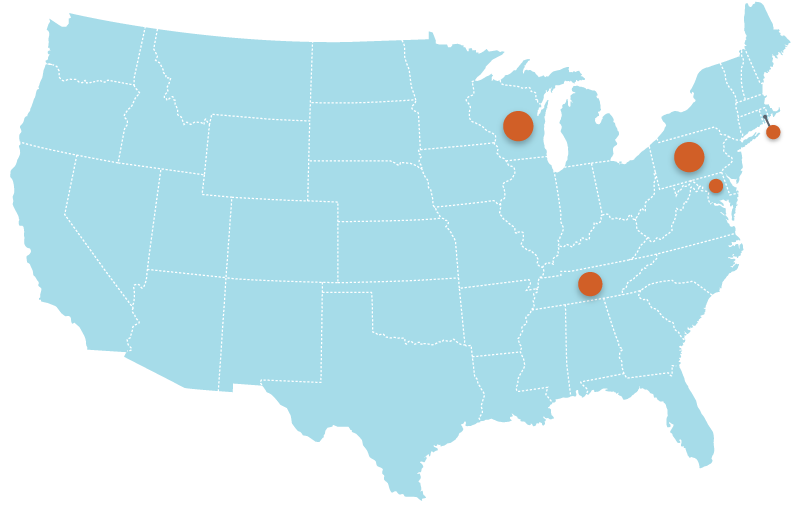Influencing Public Policy
Influencing Public Policy
Influencing Public Policy
Taking a firm stand against Medicare cuts for pathology services, the CAP and its members succeeded in saving pathologists up to $85 million in 2021.
Taking a firm stand against Medicare cuts for pathology services, the CAP and its members succeeded in saving pathologists up to $85 million in 2021.
Taking a firm stand against Medicare cuts for pathology services, the CAP and its members succeeded in saving pathologists up to $85 million in 2021.
CAP Advocates for Pathologists and Laboratories During Pandemic
The COVID-19 national crisis produced unprecedented challenges that the CAP immediately sought to address to further meet the needs of its members. As the disease spread rapidly, pathologists and laboratories needed additional protective equipment, testing supplies, and new flexibilities to bring tests for SARS-CoV-2 online and begin testing patients in their communities. In addition, the economic fallout from the pandemic hurt pathology practices financially, and they required government assistance to remain open and offer diagnostic services to patients.
Pathologists continued to have an advocate in our nation’s capital. The CAP aggressively urged the Centers for Medicare & Medicaid Services (CMS), and rallied support for our cause from members of Congress, to give pathologists and laboratory personnel flexibility during the COVID-19 national emergency. On March 26, the CAP secured a waiver for pathologists to sign out cases remotely.
In addition, the CAP worked tirelessly with regulators to ensure rules and regulations recognize current scientific understanding of COVID-19 testing and realities laboratories face in reporting COVID-19 data. Specifically, the CAP advocated on appropriate diagnostic and surveillance testing. In alignment with the American Medical Association, the CAP advocated to continue COVID-19 tests for asymptomatic patients. The CAP also advocated with the Centers for Disease Control & Prevention (CDC) in the face of unrealistic data collection and reporting requirements for COVID-19. Prior to engagement on this issue, laboratories faced burdensome data requirements—some of which were impossible for them to meet—and stiff penalties for failure to comply. The CAP advised the CDC and others on making the requirements more workable for laboratories.
To control the pandemic, the CAP sought to remove barriers to testing for patients. The CAP engaged with lawmakers to codify in new legislation that testing for COVID-19 should be covered by insurers without cost-sharing and supported $1 billion to pay for tests provided to patients without health insurance. Our advocacy also sought adequate payment for these tests.
For pathology practices in need of financial assistance, the CAP advocated for programs such as the Medicare Accelerated and Advance Payments, Provider Relief Fund, and Small Business Administration loans. Our experts followed up with timely information on which programs would best work for pathology practices and when and how to apply.
Through a series of forums, the CAP received feedback from its members and relayed that information to congressional offices and administration officials. And, CAP President Patrick Godbey, MD, FCAP, earned an appointment to the Department of Health and Human Services National Testing Implementations Forum.
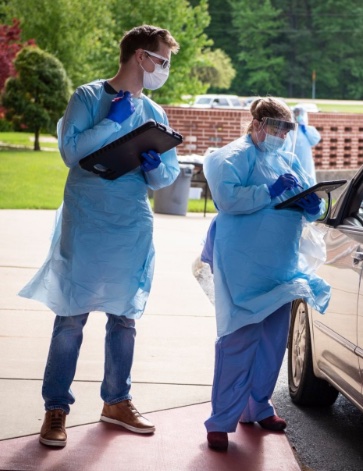
CAP Advocates for Pathologists and Laboratories During Pandemic
The COVID-19 national crisis produced unprecedented challenges that the CAP immediately sought to address to further meet the needs of its members. As the disease spread rapidly, pathologists and laboratories needed additional protective equipment, testing supplies, and new flexibilities to bring tests for SARS-CoV-2 online and begin testing patients in their communities. In addition, the economic fallout from the pandemic hurt pathology practices financially, and they required government assistance to remain open and offer diagnostic services to patients.
Pathologists continued to have an advocate in our nation’s capital. The CAP aggressively urged the Centers for Medicare & Medicaid Services (CMS), and rallied support for our cause from members of Congress, to give pathologists and laboratory personnel flexibility during the COVID-19 national emergency. On March 26, the CAP secured a waiver for pathologists to sign out cases remotely.
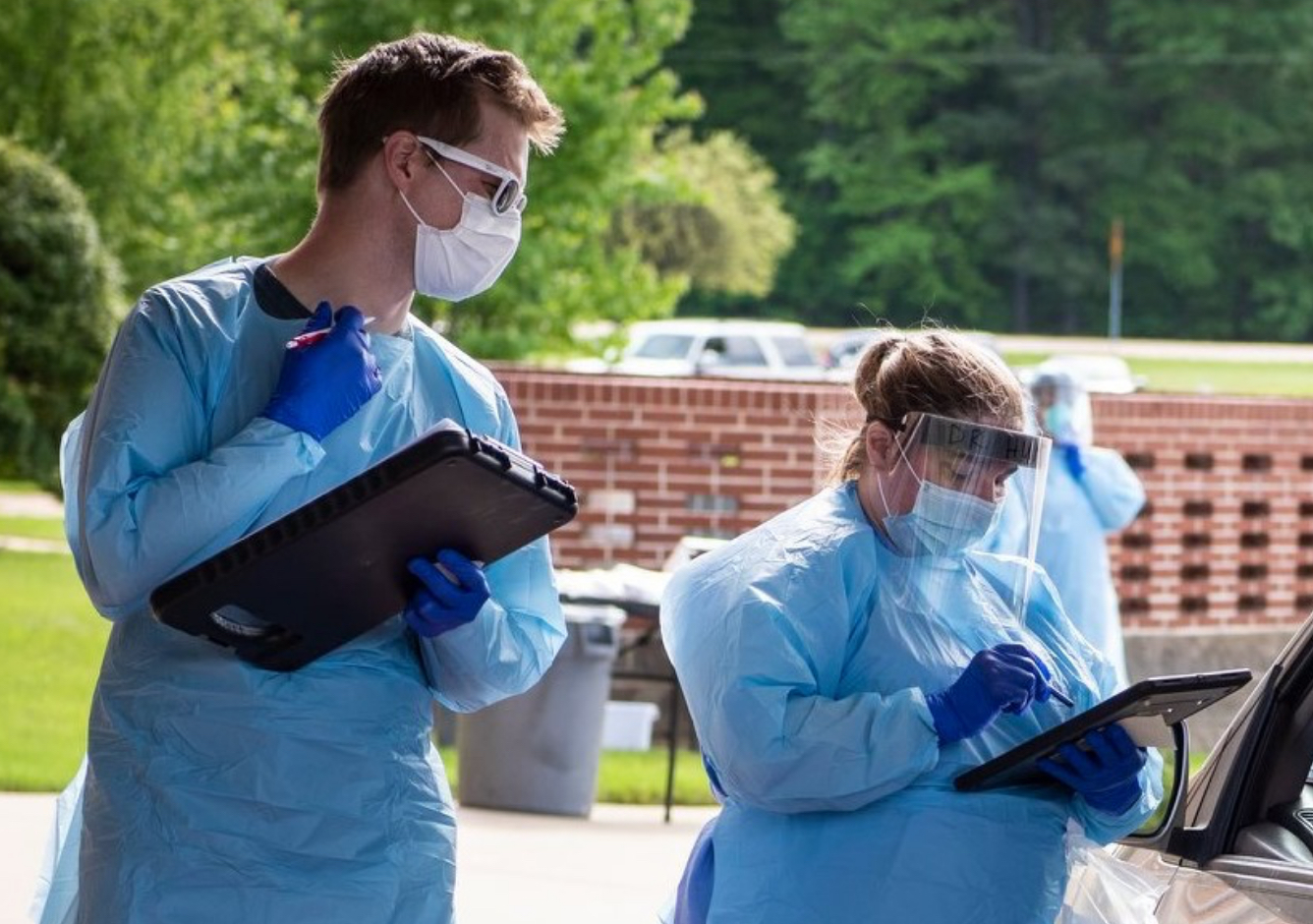
In addition, the CAP worked tirelessly with regulators to ensure rules and regulations recognize current scientific understanding of COVID-19 testing and realities laboratories face in reporting COVID-19 data. Specifically, the CAP advocated on appropriate diagnostic and surveillance testing. In alignment with the American Medical Association, the CAP advocated to continue COVID-19 tests for asymptomatic patients. The CAP also advocated with the Centers for Disease Control & Prevention (CDC) in the face of unrealistic data collection and reporting requirements for COVID-19. Prior to engagement on this issue, laboratories faced burdensome data requirements—some of which were impossible for them to meet—and stiff penalties for failure to comply. The CAP advised the CDC and others on making the requirements more workable for laboratories.
To control the pandemic, the CAP sought to remove barriers to testing for patients. The CAP engaged with lawmakers to codify in new legislation that testing for COVID-19 should be covered by insurers without cost-sharing and supported $1 billion to pay for tests provided to patients without health insurance. Our advocacy also sought adequate payment for these tests.
For pathology practices in need of financial assistance, the CAP advocated for programs such as the Medicare Accelerated and Advance Payments, Provider Relief Fund, and Small Business Administration loans. Our experts followed up with timely information on which programs would best work for pathology practices and when and how to apply.
Through a series of forums, the CAP received feedback from its members and relayed that information to congressional offices and administration officials. And, CAP President Patrick Godbey, MD, FCAP, earned an appointment to the Department of Health and Human Services National Testing Implementations Forum.
CAP Advocates for Pathologists and Laboratories During Pandemic
The COVID-19 national crisis produced unprecedented challenges that the CAP immediately sought to address to further meet the needs of its members.
As the disease spread rapidly, pathologists and laboratories needed additional protective equipment, testing supplies, and new flexibilities to bring tests for SARS-CoV-2 online and begin testing patients in their communities. In addition, the economic fallout from the pandemic hurt pathology practices financially, and they required government assistance to remain open and offer diagnostic services to patients.
Pathologists continued to have an advocate in our nation’s capital. The CAP aggressively urged the Centers for Medicare & Medicaid Services (CMS), and rallied support for our cause from members of Congress, to give pathologists and laboratory personnel flexibility during the COVID-19 national emergency. On March 26, the CAP secured a waiver for pathologists to sign out cases remotely.
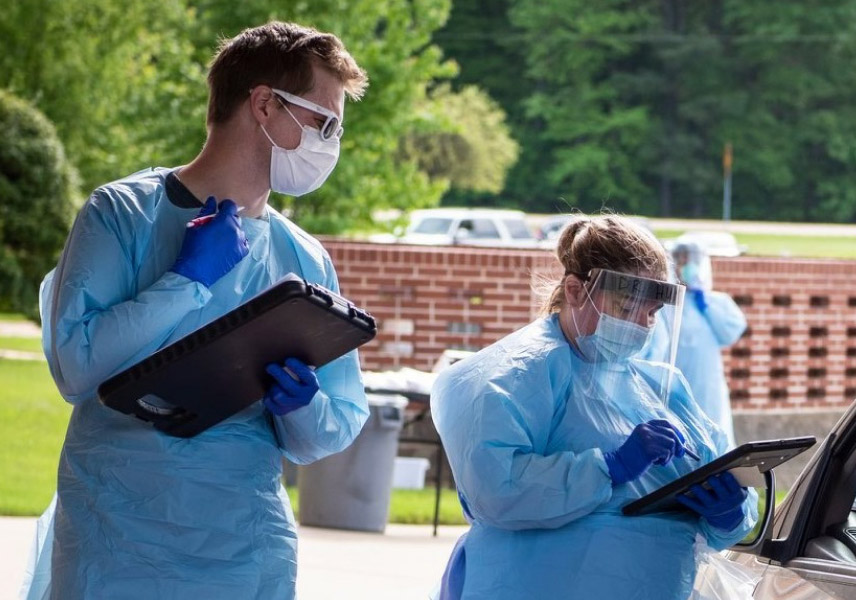
In addition, the CAP worked tirelessly with regulators to ensure rules and regulations recognize current scientific understanding of COVID-19 testing and realities laboratories face in reporting COVID-19 data. Specifically, the CAP advocated on appropriate diagnostic and surveillance testing. In alignment with the American Medical Association, the CAP advocated to continue COVID-19 tests for asymptomatic patients. The CAP also advocated with the Centers for Disease Control & Prevention (CDC) in the face of unrealistic data collection and reporting requirements for COVID-19. Prior to engagement on this issue, laboratories faced burdensome data requirements—some of which were impossible for them to meet—and stiff penalties for failure to comply. The CAP advised the CDC and others on making the requirements more workable for laboratories.
To control the pandemic, the CAP sought to remove barriers to testing for patients. The CAP engaged with lawmakers to codify in new legislation that testing for COVID-19 should be covered by insurers without cost-sharing and supported $1 billion to pay for tests provided to patients without health insurance. Our advocacy also sought adequate payment for these tests.
For pathology practices in need of financial assistance, the CAP advocated for programs such as the Medicare Accelerated and Advance Payments, Provider Relief Fund, and Small Business Administration loans. Our experts followed up with timely information on which programs would best work for pathology practices and when and how to apply.
Through a series of forums, the CAP received feedback from its members and relayed that information to congressional offices and administration officials. And, CAP President Patrick Godbey, MD, FCAP, earned an appointment to the Department of Health and Human Services National Testing Implementations Forum.
2,564 pathologists utilized the CAP’s PathNET program to send 16,285 messages to members of Congress, advocating for COVID-19 relief (including regulatory flexibility) and opposing Medicare cuts.
2,564 pathologists utilized the CAP’s PathNET program to send 16,285 messages to members of Congress, advocating for COVID-19 relief (including regulatory flexibility) and opposing Medicare cuts.
2,564 pathologists utilized the CAP’s PathNET program to send 16,285 messages to members of Congress, advocating for COVID-19 relief (including regulatory flexibility) and opposing Medicare cuts.
CAP Research on COVID-19 Informs Policy Decisions
In April, June, and September, the CAP Policy Roundtable fielded surveys to gather information about how the COVID-19 pandemic has affected pathologists and their staff. The information was designed not only to inform CAP leadership about issues facing our accredited laboratories, but also to inform the media, elected officials, and government regulators of these challenges. The surveys focused on:
- Onsite COVID-19 testing, including testing volumes versus testing capacity
- Problems laboratories faced in providing testing
- Economic impacts of the pandemic on laboratories
The CAP produced reports on each of the surveys and distributed the results broadly. In the June survey, for example, key findings were as follows:
CAP Research on COVID-19 Informs Policy Decisions
In April, June, and September, the CAP Policy Roundtable fielded surveys to gather information about how the COVID-19 pandemic has affected pathologists and their staff. The information was designed not only to inform CAP leadership about issues facing our accredited laboratories, but also to inform the media, elected officials, and government regulators of these challenges. The surveys focused on:
- Onsite COVID-19 testing, including testing volumes versus testing capacity
- Problems laboratories faced in providing testing
- Economic impacts of the pandemic on laboratories
The CAP produced reports on each of the surveys and distributed the results broadly. In the June survey, for example, key findings were as follows:
CAP Research on COVID-19 Informs Policy Decisions
In April, June, and September, the CAP Policy Roundtable fielded surveys to gather information about how the COVID-19 pandemic has affected pathologists and their staff.
The information was designed not only to inform CAP leadership about issues facing our accredited laboratories, but also to inform the media, elected officials, and government regulators of these challenges. The surveys focused on:
- Onsite COVID-19 testing, including testing volumes versus testing capacity
- Problems laboratories faced in providing testing
- Economic impacts of the pandemic on laboratories
The CAP produced reports on each of the surveys and distributed the results broadly. In the June survey, for example, key findings were as follows:
CAP Fights Medicare Cuts
The CAP and its members took a firm stand against Medicare cuts that threatened to reduce pay for pathologists’ services by 9%. With similar cuts affecting other specialties, the CAP was a leader in a physician and nonphysician provider coalition opposing cuts set to take effect in 2021. Through lobbying Congress and the administration, the CAP succeeded in reducing the Medicare cut and saving pathologists up to $85 million in 2021.
As part of the campaign to fight the cuts, the CAP mobilized 1,608 pathologists to send 8,462 messages to lawmakers in Congress. More than 180 of our members signed up to take direct action and engage with their elected officials through various activities. During PathPAC’s annual reception held virtually in October, more than 40 members of the CAP’s political action committee spoke with a US senator and member of the House of Representatives about the cuts.
The CAP’s engagements, directly with elected officials and through our coalition work, helped influence Congress to act on the Medicare cuts and other issues. In total, 2,564 pathologists utilized our PathNET program to send 16,285 messages to 500 members of Congress to advocate for COVID-19 relief, oppose Medicare cuts, and lobby for regulatory flexibility during the pandemic.
CAP Fights Medicare Cuts
The CAP and its members took a firm stand against Medicare cuts that threatened to reduce pay for pathologists’ services by 9%. With similar cuts affecting other specialties, the CAP was a leader in a physician and nonphysician provider coalition opposing cuts set to take effect in 2021. Through lobbying Congress and the administration, the CAP succeeded in reducing the Medicare cut and saving pathologists up to $85 million in 2021.
As part of the campaign to fight the cuts, the CAP mobilized 1,608 pathologists to send 8,462 messages to lawmakers in Congress. More than 180 of our members signed up to take direct action and engage with their elected officials through various activities. During PathPAC’s annual reception held virtually in October, more than 40 members of the CAP’s political action committee spoke with a US senator and member of the House of Representatives about the cuts.
The CAP’s engagements, directly with elected officials and through our coalition work, helped influence Congress to act on the Medicare cuts and other issues. In total, 2,564 pathologists utilized our PathNET program to send 16,285 messages to 500 members of Congress to advocate for COVID-19 relief, oppose Medicare cuts, and lobby for regulatory flexibility during the pandemic.
CAP Fights Medicare Cuts
The CAP and its members took a firm stand against Medicare cuts that threatened to reduce pay for pathologists’ services by 9%. With similar cuts affecting other specialties, the CAP was a leader in a physician and nonphysician provider coalition opposing cuts set to take effect in 2021.
Through lobbying Congress and the administration, the CAP succeeded in reducing the Medicare cut and saving pathologists up to $85 million in 2021.
As part of the campaign to fight the cuts, the CAP mobilized 1,608 pathologists to send 8,462 messages to lawmakers in Congress. More than 180 of our members signed up to take direct action and engage with their elected officials through various activities. During PathPAC’s annual reception held virtually in October, more than 40 members of the CAP’s political action committee spoke with a US senator and member of the House of Representatives about the cuts.
The CAP’s engagements, directly with elected officials and through our coalition work, helped influence Congress to act on the Medicare cuts and other issues. In total, 2,564 pathologists utilized our PathNET program to send 16,285 messages to 500 members of Congress to advocate for COVID-19 relief, oppose Medicare cuts, and lobby for regulatory flexibility during the pandemic.
PathPAC Amplifies Pathology’s Voice
PathPAC is bipartisan and represents the interests of pathologists on Capitol Hill through political and financial means. As a 501c6 nonprofit, the CAP is the only association with a federal political action committee strictly representing the interests of pathologists. PathPAC is the voice of pathology in the election process.
During a busy election year, PathPAC raised $190,427 and disbursed $287,000 to 97 congressional races. In addition to donating to PathPAC, CAP members also attended several virtual events with members of Congress and their legislative staffs. Elected officials receiving funds from PathPAC won 94% of their races in 2020.
PathPAC Amplifies Pathology’s Voice
PathPAC is bipartisan and represents the interests of pathologists on Capitol Hill through political and financial means. As a 501c6 nonprofit, the CAP is the only association with a federal political action committee strictly representing the interests of pathologists. PathPAC is the voice of pathology in the election process.
During a busy election year, PathPAC raised $190,427 and disbursed $287,000 to 97 congressional races. In addition to donating to PathPAC, CAP members also attended several virtual events with members of Congress and their legislative staffs. Elected officials receiving funds from PathPAC won 94% of their races in 2020.
PathPAC Amplifies Pathology’s Voice
PathPAC is bipartisan and represents the interests of pathologists on Capitol Hill through political and financial means. As a 501c6 nonprofit, the CAP is the only association with a federal political action committee strictly representing the interests of pathologists. PathPAC is the voice of pathology in the election process.
During a busy election year, PathPAC raised $190,427 and disbursed $287,000 to 97 congressional races. In addition to donating to PathPAC, CAP members also attended several virtual events with members of Congress and their legislative staffs. Elected officials receiving funds from PathPAC won 94% of their races in 2020.
CAP Protects the Value of Pathology Services
The CAP opposed actions by public and private insurance payers to decrease and diminish the value of pathology services to patients. Not only did the CAP fight efforts to cut reimbursements to pathologists, our direct actions in 2019 yielded some increases in payment for certain pathology services.
In Medicare, the molecular pathology interpretation and report service was identified as potentially misvalued in 2018. As the only pathologist organization with a seat on the Relative Value Scale Update Committee (RUC), which recommends what Medicare pays for physician services, the CAP led its review. The CAP developed physician work relative value units used to calculate the professional component of molecular interpretation service and, in 2019, the RUC agreed to increase the physician work relative value units to 0.93, from 0.37, for the service. For 2021, the CMS agreed and increased the physician work relative value for the service by 151%.
In the private sector, the CAP championed policies to protect access to pathology services and oppose overburdening pathologists with administrative requirements. After discussions with the CAP over concerns of overburdening laboratories during the current pandemic, UnitedHealthcare delayed implementation of a test registry program until April 2021.
The CAP also successfully worked with the New Jersey Society of Pathologists to revise daily maximum limits for units of surgical pathology and microscopic examination services by Horizon Blue Cross Blue Shield of New Jersey. The CAP urged the insurer to make the changes as the limits were deemed too restrictive for pathologists diagnosing diseases in the state.
Following reports of private sector fee schedule cuts to pathologists, the CAP continued to press Anthem and UnitedHealthcare to reverse decreases, especially in light of the pandemic. The CAP emphasized the important role pathologists and laboratory testing have in delivering quality patient care as communities across the nation manage the COVID-19 crisis.
CAP Protects the Value of Pathology Services
The CAP opposed actions by public and private insurance payers to decrease and diminish the value of pathology services to patients. Not only did the CAP fight efforts to cut reimbursements to pathologists, our direct actions in 2019 yielded some increases in payment for certain pathology services.
In Medicare, the molecular pathology interpretation and report service was identified as potentially misvalued in 2018. As the only pathologist organization with a seat on the Relative Value Scale Update Committee (RUC), which recommends what Medicare pays for physician services, the CAP led its review. The CAP developed physician work relative value units used to calculate the professional component of molecular interpretation service and, in 2019, the RUC agreed to increase the physician work relative value units to 0.93, from 0.37, for the service. For 2021, the CMS agreed and increased the physician work relative value for the service by 151%.
In the private sector, the CAP championed policies to protect access to pathology services and oppose overburdening pathologists with administrative requirements. After discussions with the CAP over concerns of overburdening laboratories during the current pandemic, UnitedHealthcare delayed implementation of a test registry program until April 2021.
The CAP also successfully worked with the New Jersey Society of Pathologists to revise daily maximum limits for units of surgical pathology and microscopic examination services by Horizon Blue Cross Blue Shield of New Jersey. The CAP urged the insurer to make the changes as the limits were deemed too restrictive for pathologists diagnosing diseases in the state.
Following reports of private sector fee schedule cuts to pathologists, the CAP continued to press Anthem and UnitedHealthcare to reverse decreases, especially in light of the pandemic. The CAP emphasized the important role pathologists and laboratory testing have in delivering quality patient care as communities across the nation manage the COVID-19 crisis.
CAP Protects the Value of Pathology Services
The CAP opposed actions by public and private insurance payers to decrease and diminish the value of pathology services to patients. Not only did the CAP fight efforts to cut reimbursements to pathologists, our direct actions in 2019 yielded some increases in payment for certain pathology services.
In Medicare, the molecular pathology interpretation and report service was identified as potentially misvalued in 2018. As the only pathologist organization with a seat on the Relative Value Scale Update Committee (RUC), which recommends what Medicare pays for physician services, the CAP led its review. The CAP developed physician work relative value units used to calculate the professional component of molecular interpretation service and, in 2019, the RUC agreed to increase the physician work relative value units to 0.93, from 0.37, for the service. For 2021, the CMS agreed and increased the physician work relative value for the service by 151%.
In the private sector, the CAP championed policies to protect access to pathology services and oppose overburdening pathologists with administrative requirements. After discussions with the CAP over concerns of overburdening laboratories during the current pandemic, UnitedHealthcare delayed implementation of a test registry program until April 2021.
The CAP also successfully worked with the New Jersey Society of Pathologists to revise daily maximum limits for units of surgical pathology and microscopic examination services by Horizon Blue Cross Blue Shield of New Jersey. The CAP urged the insurer to make the changes as the limits were deemed too restrictive for pathologists diagnosing diseases in the state.
Following reports of private sector fee schedule cuts to pathologists, the CAP continued to press Anthem and UnitedHealthcare to reverse decreases, especially in light of the pandemic. The CAP emphasized the important role pathologists and laboratory testing have in delivering quality patient care as communities across the nation manage the COVID-19 crisis.
Pathologists Find Success with New Payment Models
The Pathologists Quality Registry, now in its third year, is part of the foundation of the CAP’s Medicare Quality Payment Program strategy for ensuring pathologists’ success in the changing payment environment. Considering pressures from the COVID-19 pandemic and changing Medicare rules for the Merit-based Incentive Payment System (MIPS), enrollment in the Pathologists Quality Registry remained strong at about 1,000 pathologists. Looking ahead to 2021, the CAP again secured the CMS designation of a Qualified Clinical Data Registry for the Pathologists Quality Registry.
With every pathologist’s attention turned to the pandemic, the CAP advocated for reducing MIPS reporting burdens. The CMS instituted COVID-19 relief for MIPS participants who could not provide quality reporting data in 2020. The CAP provided information to pathology practices on how to submit an extreme and uncontrollable hardship exemption application.
Importantly, the CAP remains committed to serving as a valuable, hands-on resource to its members, which includes looking out for their best interests. For example, the CAP advises pathologists participating in the Pathologists Quality Registry to confirm that their MIPS scores are accurate and devoid of errors. In 2020, the CAP helped discover instances where scores were incorrect, worked with pathology practices to initiate the necessary corrections with the CMS, and directly advocated with the CMS on practices’ behalf.
Pathologists Find Success with New Payment Models
The Pathologists Quality Registry, now in its third year, is part of the foundation of the CAP’s Medicare Quality Payment Program strategy for ensuring pathologists’ success in the changing payment environment. Considering pressures from the COVID-19 pandemic and changing Medicare rules for the Merit-based Incentive Payment System (MIPS), enrollment in the Pathologists Quality Registry remained strong at about 1,000 pathologists. Looking ahead to 2021, the CAP again secured the CMS designation of a Qualified Clinical Data Registry for the Pathologists Quality Registry.
With every pathologist’s attention turned to the pandemic, the CAP advocated for reducing MIPS reporting burdens. The CMS instituted COVID-19 relief for MIPS participants who could not provide quality reporting data in 2020. The CAP provided information to pathology practices on how to submit an extreme and uncontrollable hardship exemption application.
Importantly, the CAP remains committed to serving as a valuable, hands-on resource to its members, which includes looking out for their best interests. For example, the CAP advises pathologists participating in the Pathologists Quality Registry to confirm that their MIPS scores are accurate and devoid of errors. In 2020, the CAP helped discover instances where scores were incorrect, worked with pathology practices to initiate the necessary corrections with the CMS, and directly advocated with the CMS on practices’ behalf.
Pathologists Find Success with New Payment Models
The Pathologists Quality Registry, now in its third year, is part of the foundation of the CAP’s Medicare Quality Payment Program strategy for ensuring pathologists’ success in the changing payment environment.
Considering pressures from the COVID-19 pandemic and changing Medicare rules for the Merit-based Incentive Payment System (MIPS), enrollment in the Pathologists Quality Registry remained strong at about 1,000 pathologists. Looking ahead to 2021, the CAP again secured the CMS designation of a Qualified Clinical Data Registry for the Pathologists Quality Registry.
With every pathologist’s attention turned to the pandemic, the CAP advocated for reducing MIPS reporting burdens. The CMS instituted COVID-19 relief for MIPS participants who could not provide quality reporting data in 2020. The CAP provided information to pathology practices on how to submit an extreme and uncontrollable hardship exemption application.
Importantly, the CAP remains committed to serving as a valuable, hands-on resource to its members, which includes looking out for their best interests. For example, the CAP advises pathologists participating in the Pathologists Quality Registry to confirm that their MIPS scores are accurate and devoid of errors. In 2020, the CAP helped discover instances where scores were incorrect, worked with pathology practices to initiate the necessary corrections with the CMS, and directly advocated with the CMS on practices’ behalf.
CAP Partners with State Pathology Societies to Protect Patients
To strengthen the pathology profession nationwide, the CAP collaborated with state pathology societies to enhance advocacy efforts at the state level. The CAP supports state pathology societies working to protect patients from surprise medical bills. In 2020, the CAP worked with pathology societies in four states—Georgia, Michigan, Virginia, and West Virginia—to enact favorable out-of-network billing legislation, totaling 16 states with such laws in place protecting patients from unexpected medical bills.
The CAP worked with a multi-specialty coalition in Georgia to pass an out-of-network law that bans surprise medical billing and establishes out-of-network payment by health insurers. The Michigan Society of Pathologists and CAP worked together to support out-of-network billing legislation passed in October 2020. The CAP worked with the pathologists in Virginia to pass a law that mandates out-of-network care is reimbursed at reasonable rates. Finally, the state of West Virginia passed a historic network adequacy law after years of advocacy from the CAP and West Virginia Society of Pathologists.
The CAP also worked with Connecticut, Massachusetts, and Pennsylvania pathology societies to improve executive orders on out-of-network COVID-19 testing or amend existing out-of-network legislation and reduce administrative reporting burdens for pathologists.
CAP Partners with State Pathology Societies to Protect Patients
To strengthen the pathology profession nationwide, the CAP collaborated with state pathology societies to enhance advocacy efforts at the state level. The CAP supports state pathology societies working to protect patients from surprise medical bills. In 2020, the CAP worked with pathology societies in four states—Georgia, Michigan, Virginia, and West Virginia—to enact favorable out-of-network billing legislation, totaling 16 states with such laws in place protecting patients from unexpected medical bills.
The CAP worked with a multi-specialty coalition in Georgia to pass an out-of-network law that bans surprise medical billing and establishes out-of-network payment by health insurers. The Michigan Society of Pathologists and CAP worked together to support out-of-network billing legislation passed in October 2020. The CAP worked with the pathologists in Virginia to pass a law that mandates out-of-network care is reimbursed at reasonable rates. Finally, the state of West Virginia passed a historic network adequacy law after years of advocacy from the CAP and West Virginia Society of Pathologists.
The CAP also worked with Connecticut, Massachusetts, and Pennsylvania pathology societies to improve executive orders on out-of-network COVID-19 testing or amend existing out-of-network legislation and reduce administrative reporting burdens for pathologists.
CAP Partners with State Pathology Societies to Protect Patients
To strengthen the pathology profession nationwide, the CAP collaborated with state pathology societies to enhance advocacy efforts at the state level. The CAP supports state pathology societies working to protect patients from surprise medical bills.
In 2020, the CAP worked with pathology societies in four states—Georgia, Michigan, Virginia, and West Virginia—to enact favorable out-of-network billing legislation, totaling 16 states with such laws in place protecting patients from unexpected medical bills.
The CAP worked with a multi-specialty coalition in Georgia to pass an out-of-network law that bans surprise medical billing and establishes out-of-network payment by health insurers. The Michigan Society of Pathologists and CAP worked together to support out-of-network billing legislation passed in October 2020. The CAP worked with the pathologists in Virginia to pass a law that mandates out-of-network care is reimbursed at reasonable rates. Finally, the state of West Virginia passed a historic network adequacy law after years of advocacy from the CAP and West Virginia Society of Pathologists.
The CAP also worked with Connecticut, Massachusetts, and Pennsylvania pathology societies to improve executive orders on out-of-network COVID-19 testing or amend existing out-of-network legislation and reduce administrative reporting burdens for pathologists.
OUT-OF-NETWORK BILLING LEGISLATION
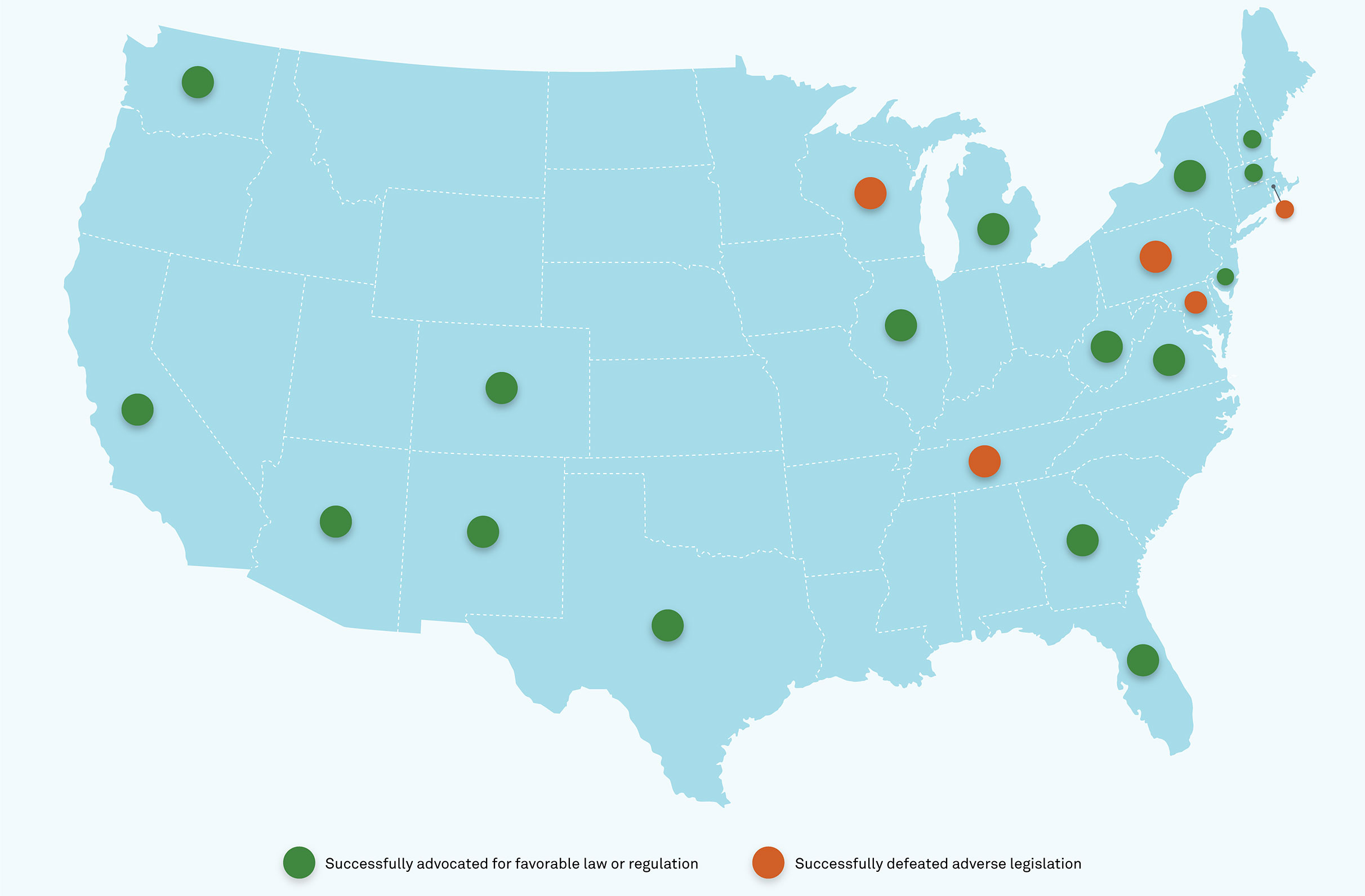
OUT-OF-NETWORK BILLING LEGISLATION
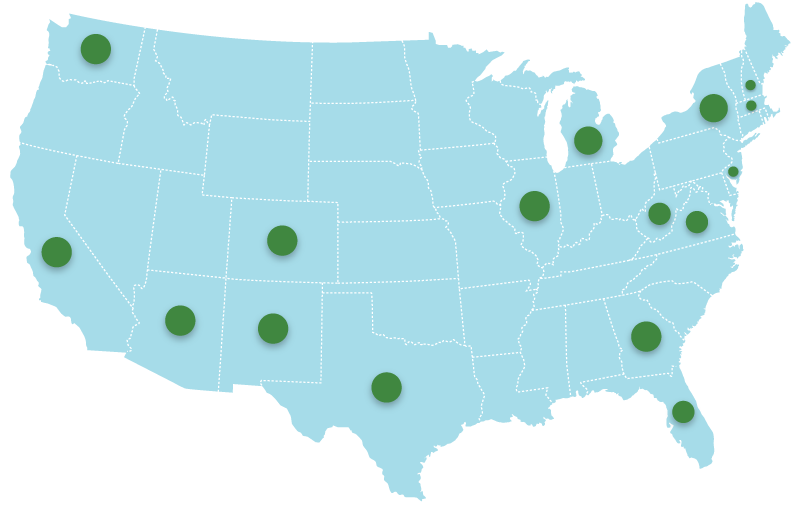

Successfully advocated for favorable law or regulation
